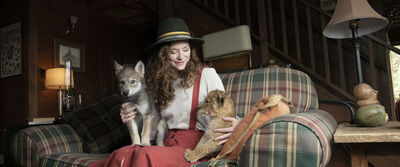
“The Wolf and the Lion” is a lot like the internet: about half aww-inspiring scenes of irresistibly cute animals and the other half dumb, boring human beings. Writer/director and animal activist Gilles de Maistre re-teams with his “Mia and the White Lion” co-writer Prune de Maistre and producers for another film about the importance of allowing wild animals to live in freedom, with humans interfering only to keep them safe. Pre-production on this film began when the animals in the title were just one month old so that their earliest moments together and their growth could be part of the story, and so they and the actors would be comfortable with each other.
By far the best part of “The Wolf and the Lion” is the remarkable footage of the animals. This is not CGI. This is a real-life wolf and a real-life lion who are, the end credit sequence assures us, real-life best friends. The human characters and the slight storyline designed around them is incidental not just to the animal footage but to his message about the importance of allowing wild animals to stay in the wild. After all, as well-cared for as they certainly are, the working animals telling us this story are living in civilization and performing for a camera.
The movie’s opening shots set up the conflict between the beauty of the natural world and the cruelty of the human world. First, there's an idyllic scene of a mother lion with her cubs on the African veld, illuminated by golden light and an artistic sun flare, and then a close-up of the barrel of a gun. A cub is then put in a cage that is packed onto a small plane, the cub-napped baby making throaty squeaking sounds of fear as the plane takes off for the other side of the world, sold to a circus in Canada.
The human who will befriend the animals begins as far from the wilds of Africa as possible. Classical piano student Alma (Molly Kunz), lives in a big city and is working hard on an upcoming competition. A teacher tries unsuccessfully to reassure her, but she snaps, “I don’t want it to be great. I want it to be perfect.”
Alma’s beloved grandfather has just died, and so she makes a brief trip to Quebec for his eco-funeral. His house is the only building on a remote island so far from the rest of the world that there is no phone or cell signal. He has left her a recorded message, telling her to trust her heart and explaining that he has befriended a she-wolf. “She isn’t tame, of course, but she is not fearful,” he says, so the wolf may come to the house. The plane carrying the lion cub crashes and the cub literally falls into Alma’s arms. Mama she-wolf comes to the house, bringing her cub and nurses both babies as though the little lion is part of her litter. When she disappears, Alma takes over, making it a three-species family. Her plans for a one-night visit turn into an indefinite stay.
The setting is screen-saver beautiful, a pristine, remote island that happens to have a spacious house with huge glass windows looking out onto the water and a lovely in-tune grand piano. Alma and the two cubs live an Edenic existence. (You may recognize the house from the Johnny Depp film "Secret Window.")
The lion may not lie down with the lamb, but the two babies frolic adorably. This is the part where we get to watch cute baby animals eat the carrot nose off of a snowman. There will indeed be “awws.” Everything is perfect. Until they are discovered. The wildlife authorities take the wolf and the lion away from the island.
The circus that paid for the lion wants it to sell tickets and the cruel ringmaster plans to remove the lion’s claws and make him do tricks with a whip and drugs. The wolf is taken to a preserve by a self-described “important scientist” trying to preserve the rare breed by releasing them once the population is sustainable. He is furious at Anna for trying to domesticate a wild beast. “Poor guy’s more imprinted than a chihuahua in Beverly Hills.”
That is as close as this movie comes to dialogue that rises above the level of “You’re acting like a spoiled brat.” “You’re acting like a stupid adult.” “Do you think I’m crazy?” “No, I think you’re wonderful.” The human parts of the story barely register except as distractions, with abrupt changes of character. Alma is stressed and committed to piano. Until she isn’t. The circus guy is almost ridiculously awful. Until he isn’t. Poor Graham Greene has a thankless “be careful, dear” role as Alma’s godfather. The wolf and the lion make a great team; the humans and the script do not.
Now playing in theaters.
0 Commentaires